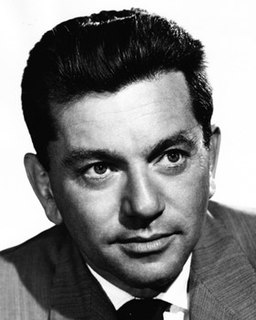
Irving Reis was a radio program producer and director, and a film director.

Ace the Wonder Dog was a German Shepherd Dog that acted in several films and film serials from 1938 to 1946. His first appearance was in the 1938 Lew Landers film Blind Alibi. He is considered by many critics an attempt by RKO Pictures to cash in on the success of Warner Bros.' canine sensation, Rin Tin Tin.
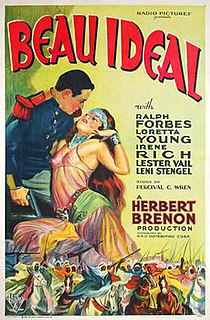
Beau Ideal is a 1931 American pre-Code adventure film directed by Herbert Brenon and released by RKO Radio Pictures. The film was based on the 1927 adventure novel Beau Ideal by P. C. Wren, the third novel in a series of five novels based around the same characters. Brenon had directed the first in the series, Beau Geste, which was a very successful silent film in 1926. The screenplay was adapted from Wren's novel by Paul Schofield, who had also written the screenplay for the 1926 Beau Geste, with contributions from Elizabeth Meehan and Marie Halvey.

Headline Shooter is a 1933 American pre-Code drama about the life of a newsreel photographer. Director Otto Brower intertwined the screenplay written by Agnes Christine Johnston, Allen Rivkin, and Arthur Kober, with actual newsreel footage of natural and man-made disasters. The film starred William Gargan, Frances Dee, Ralph Bellamy, and Jack LaRue.
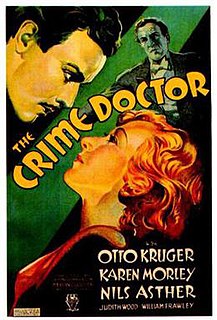
The Crime Doctor is a 1934 American crime drama directed by John Robertson from a screenplay by Jane Murfin, adapted from the novel The Big Bow Mystery by Israel Zangwill. The film stars Otto Kruger, Karen Morley, and Nils Asther. RKO Radio Pictures produced and distributed the film which was released on April 27, 1934.

By Your Leave is a 1934 American domestic comedy film directed by Lloyd Corrigan from a script by Allan Scott, Lewis Foster, and Sam Mintz. The screenplay was based on a play of the same name by Gladys Hurlbut and Emma B. C. Wells, which had a short run early in the year at the Morosco Theatre. The film was produced by Pandro S. Berman, and starred Frank Morgan and Genevieve Tobin, although several other actresses were initially scheduled to appear in the film, including Mary Astor and Ann Harding. Both stars were on loan to RKO from other studios. It marked the film debuts of two notable Broadway actors, Glenn Anders and Gene Lockhart, the latter of which had a lengthy Hollywood career. By Your Leave opened on November 9, 1934, and received mostly positive reviews.

A Dog of Flanders is a 1935 American drama film directed by Edward Sloman, based on a screenplay by Ainsworth Morgan from the story by Dorothy Yost, which she adapted from the 1872 novel of the same name by Ouida. The film stars Frankie Thomas, appearing in only his second film.

The Arizonian is a 1935 American Western film directed by Charles Vidor and starring Richard Dix, Margot Grahame, Preston Foster, and Louis Calhern. The screenplay was by Dudley Nichols. The film was released by RKO Radio Pictures on June 28, 1935.
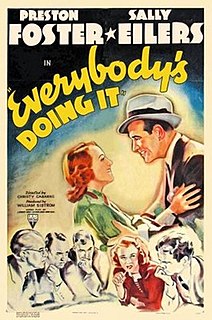
Everybody's Doing It is a 1938 American comedy film directed by Christy Cabanne using a screenplay by J. Robert Bren, Edmund Joseph, and Harry Segall, based on George Beck's story. RKO produced and distributed the film, releasing it on January 14, 1938. The movie stars Preston Foster and Sally Eilers.
Double Danger is a 1938 American crime drama directed by Lew Landers, using a screenplay by Arthur T. Horman and J. Robert Bren based on Horman's story. The film stars Preston Foster and Whitney Bourne, with supporting roles by Donald Meek and Samuel S. Hinds. Produced by RKO Radio Pictures, it was released on January 28, 1938.

Arizona Legion is a 1939 American Western film directed by David Howard from a screenplay by Oliver Drake, based on Bernard McConville's story. Produced and distributed by RKO Radio Pictures, it was released on January 20, 1939, and stars George O'Brien and Laraine Day.
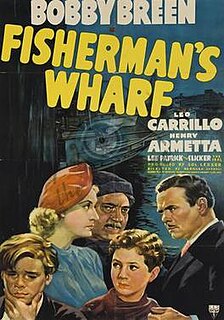
Fisherman's Wharf is a 1939 American drama film directed by Bernard Vorhaus from a screenplay by Bernard Schubert, Ian McLellan Hunter, and H. Clyde Lewis. The film stars Bobby Breen, Leo Carillo, Lee Patrick, and Slicker, "the silly seal". Produced by Sol Lesser for RKO Radio Pictures, who also distributed the film, it was released on February 3, 1939.

Conspiracy is a 1939 American spy drama film directed by Lew Landers, from a screenplay by Jerome Chodorov, based on the story, "Salute to Hate", by John McCarthy and Faith Thomas. The film stars Allan Lane, Linda Hayes, and Robert Barrat, and was produced and distributed by RKO Radio Pictures, who premiered the film in New York City on August 23, 1939, with a general release on September 1.

Around the World is a 1943 American comedy film produced and directed by Allan Dwan, from an original screenplay by Ralph Spence. RKO Radio Pictures premiered the film at the Globe Theater in New York on November 24, 1943. The film has a large cast, and stars Kay Kyser and his band, Mischa Auer, Joan Davis, Marcy McGuire, Wally Brown, and Alan Carney.
Charles R. Rogers, was an American film producer whose career spanned both the silent and sound film eras. Rogers began his career on the 1924 silent film, A Cafe in Cairo, produced by the short-lived Hunt Stromberg Productions. After Stromberg ceased productions in 1925, Rogers would found his own independent company, Charles R. Rogers Productions. He would also produce for major studios such as RKO Radio Pictures, Universal, and United Artists. The pinnacle of his career would be from 1936 to 1938 when he was chosen as the vice-president in charge of production for Universal Pictures. He died as the result of injuries sustained in a car accident in 1957.
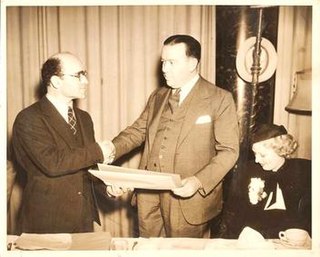
Cliff Reid, also known as George Clifford Reid, was an American film producer and film production studio founder during the 1930s and 1940s. In addition he also directed film shorts, and was the assistant director on several feature films.
Maury Cohen, also known as Maury M. Cohen, was an American film producer most active during the 1930s. He owned one of the Poverty Row studios, Invincible films, which specialized in making low-budget feature films. After leaving film in the early 1940s, Cohen founded and ran the historic dance club in Los Angeles, the Hollywood Palladium.

Samuel J. Briskin was one of the foremost producers of Hollywood's Golden Age, and head of production during his career at three of the "Big 8" major film studios: Columbia Pictures (twice), Paramount Pictures, and RKO Pictures. In the late 1950s, he was briefly on the board of directors of another major, Metro-Goldwyn-Mayer. During World War II, Briskin served in the army's Signal Corps as a film producer, attaining the rank of lieutenant colonel. After the war he co-founded Liberty Films with Frank Capra. They were later joined by William Wyler and George Stevens. The studio only produced two films, but both are now considered classics: It's a Wonderful Life and State of the Union. All three of his brothers were also film producers, as well as one of his sons, and his sister was married to the eventual Chairman of Columbia, where Briskin spent the last decade of his life as a vice-president and head of production until his death in 1968 from a heart attack.
Lee Marcus, also known as Lee S. Marcus, was an American film producer of the 1930s and 1940s. During his fifteen-year career he produced over 85 films, most of them between 1934 and 1941 while he was at RKO Studios. Prior to his production career, Marcus worked for FBO and then RKO as a sales executive, reaching the level of vice president in both organizations. At RKO, he was head of production of the studio's b-films during the late 1930s and the beginning of the 1940s. He was also responsible for producing what many consider to be the first film noir, 1940's Stranger on the Third Floor.
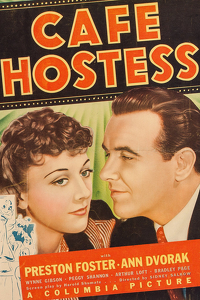
Cafe Hostess is a 1940 American crime film directed by Sidney Salkow and starring Preston Foster and Ann Dvorak. The screenplay was written by Harold Shumate, based on a story by Tay Garnett and Howard Higgin. Prior to filming the studio had been warned by the MPAA that the film did not comply with its code, but it is unclear whether changes were made to the script.
















